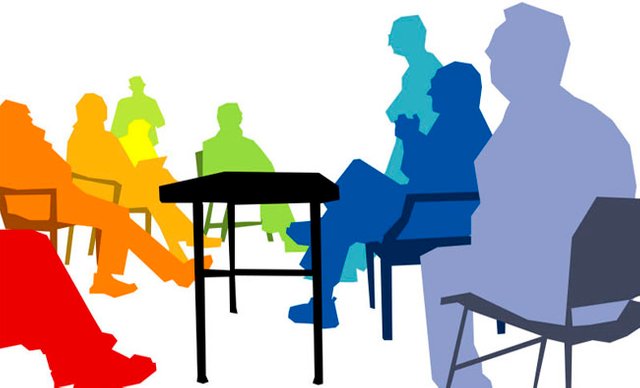How Decisions Made By Anarchists During Those PreviousTimes?
How Decisions Made By Anarchists During Those PreviousTimes?

Image Source
There ought to be almost certainly that human beings can settle on decisions in non-various leveled, egalitarian ways. The majority of human societies have been stateless, and many stateless societies have not been administered by the directs of some "Big Man," however by common assemblies utilizing some form of consensus. Various consensus-based societies have survived thousands of years, even through European colonialism into the present day, in Africa, Australia, Asia, the Americas, and on the peripheries of Europe. People from societies in which decision-making power has been consumed by the state and corporations may initially think that its hard to settle on decisions in a libertarian way, however it gets less demanding with practice.
We all have involvement with horizontal decision-making. A large portion of the decisions we make in day by day life, with friends and ideally with associates and family too, we make on the premise of cooperation as opposed to authority. Friendship is valuable since it is a space in which we interact as equivalents, where our assessments are esteemed paying little respect to our social status. Groups of friends typically utilize informal consensus to decide how to get to know one another, sort out activities, help one another, and react to challenges in their every day lives.
So the greater part of us as of now understand consensus naturally, it takes more practice to figure out how to come to consensus with people who are essentially not the same as us, especially in huge groups or when it is important to arrange complex activities. Consensus isn't the main empowering way to decide. In specific possibilities, groups that are genuinely voluntary associations can even now be empowering for their members when they utilize majority decision-making. Or, then again one individual making its own decisions and acting alone can motivate handfuls more people to take comparative actions, or to help what it has begun, in this manner staying away from the sometimes smothering weight of meetings.
One of the most surely understood anarchist histories is that of the Spanish Civil War. In July 1936, General Franco propelled a rightist coup in Spain. From the stance of the elite, it was an essential act, the country's military officers, landowners, and religious pecking order were frightened by developing anarchist and socialist movements. The government had just been canceled, however the workers and peasants were not content with delegate democracy.

Image Source
The coup did not go easily. While in many areas Spain's Republican government moved over effectively and surrendered itself to dictatorship, the anarchist labor union and different anarchists working autonomously formed militias, seized arms stockpiles, raged sleeping enclosure, and defeated prepared troops. Anarchists were especially solid in Catalunya, Aragon, Asturias, and quite a bit of Andalucia. Workers additionally defeated the coup in Madrid and Valencia, where the socialists were solid, and in a significant part of the Basque nation. In the anarchist areas, the government adequately stopped to work.
In these stateless areas of the Spanish countryside in 1936, peasants sorted out themselves as per principles of collectivism, communism, and mutualism as per their inclinations and local conditions. They formed thousands of collectives, especially in Aragon, Catalunya, and Valencia. Some nullified all money and private property, some composed quota systems to guarantee that everyone's needs were met. The assorted variety of forms they developed is a demonstration of the freedom they made themselves.
Where once all these villages were buried in a similar smothering setting of feudalism and developing capitalism, inside months of toppling government authority and coming together in village assemblies, they brought forth hundreds of various systems, joined by common values like solidarity and self-organization. What's more, they developed these diverse forms by holding open assemblies and making decisions about their future in common.

Image Source
Consensus Meetings
Sometimes, a group can't tackle a particular issue, however the alternative of not coming to any decision demonstrates that inside consensus, the health of the group is more critical than productivity. Such groups form on the principle of voluntary association, anyone is free to leave if wishes to, as opposed to authoritarian structures that may deny people the right to leave or absolved themselves from an arrangement they don't consent to. As per this principle, it is smarter to regard the contrasting views of the members of a group than to enforce a decision that leaves a few people excluded or hushed.
This may appear to be impractical to the individuals who have not participated in such process, but rather consensus has served many infoshops and comparable projects in the US for quite a long time. Utilizing consensus, these groups have made the decisions important to compose spaces and events, connect with the encompassing groups, get new participants, fund-raise, and oppose endeavors by local government and business leaders to close them down.
A common protestation is that consensus meetings take longer, yet would they say they are really less proficient? Authoritarian models of decision-making, incorporating majority voting in which the minority is forced to conform to the decision of the majority, hide or externalize their actual costs. Groups that utilization authoritarian intends to settle on their decisions can't exist without police or some other structure to enforce these decisions.
Consensus precludes the requirement for enforcement and discipline by making beyond any doubt that everyone is fulfilled in advance. When we consider all the work hours a group loses keeping up a police force, which is an immense deplete on resources, the hours spent in consensus meetings appear like a decent use of time all things considered.

Image Source
Enforcing Decisions
The state has so altogether darkened the fact that people are fit for executing their own particular decisions that those brought up in this society are unable to imagine how this should be possible without giving a small minority the authority to force people into following orders. Despite what might be expected, the power to enforce decisions ought to be just as universal and decentralized as the power to settle on those decisions.
There have been stateless societies on each landmass that utilized diffuse sanctions instead of specialized enforcers. Just through a long and vicious process do states take this capacity from people and corner it as their own.
This is the manner by which diffuse sanctions work, in a progressing process, a society decides how it needs to sort out and what behaviors it considers inadmissible. This may happen after some time or in formal, prompt settings. The participation of everyone in making these decisions is supplemented by the participation of everyone in maintaining them. On the off chance that some person breaks these common standards, everyone is acclimated to reacting. They don't call the police, file a grievance, or sit tight for someone else to accomplish something, they approach the individual they believe is in the wrong and let him know, or make another suitable move.
In a horizontal society, people enforce decisions as per how energetic they are about those decisions. On the off chance that practically everyone strongly bolsters a decision, it will be maintained overwhelmingly, while if a decision leaves the vast majority feeling impartial or apathetic, it might be partially enforced, leaving open more room for inventive transgression and investigating different arrangements. Then again an absence of eagerness in actualizing decisions may imply that in practice organization falls on the shoulders of informal powerholders, people who are delegated an unofficial position of leadership by the rest of the group, regardless of whether they need it or not.

Image Source
This implies members of horizontal groups, from collective houses to whole societies, must stand up to the issue of self-discipline. They should consider themselves accountable to the standards they have settled upon and the feedback of their associates, and hazard being disagreeable or going up against struggle by censuring the individuals who don't maintain common standards, calling out the housemate who does not do dishes or the group that does not add to street support. It's a troublesome process, frequently ailing in many current anarchist projects, yet without it group decision-making is a façade and obligation is unclear and unequally shared.
Experiencing this process, people turn out to be more empowered and more associated with everyone around them. Groups always contain the likelihood for conformity and struggle. Authoritarian groups typically maintain a strategic distance from strife by enforcing more noteworthy levels of conformity. Pressures to conform likewise exist in anarchist groups, however without restrictions on human movement, it is less demanding for people to leave and join different groups or to act or live alone. In this way, people can pick the levels of conformity and strife they need to endure, and in the process of finding and leaving groups, people change and challenge social norms.

Image Source

Reference:
https://theanarchistlibrary.org/library/seeds-for-change-consensus-decision-making
https://askananarchist.org/decisions/
Anarchy Works, by Peter Gelderloos
https://en.wikibooks.org/wiki/Anarchist_FAQ/What_is_Anarchism%3F/2.12
https://francoistremblay.wordpress.com/2011/03/17/consensus-is-just-decision-making-by-bullying/
Although it is true that the anarchist movements were very important in the Civil War of my country, the interpretation is not correct. The uprising that provoked the entrance of the troops of Franco were the numerous murders that were committing the communists, among which are the murders happened in Asturias in which they came to burn Churches with their pastors inside. As I said earlier the Anarchist movements had their importance. But the majority ideological struggle was Communism Vs Extreme Right.
Appreciate your comment @teks. Thanks for the add up. Can we possibly find any source of your information? I wanted to read it and hopefully come with another article for it.
Gabriel Jackson and Hugh Thomas have made really valuable books on the Spanish Civil War, the Second Republic and the causes and consequences of the war.
Unfortunately, much of the information prior to Franco's uprising does not appear on the Internet. And the information that appears is almost always politicized in one direction or another.
This page can serve you, although as I said before the books better.
http://www.historiasiglo20.org/HE/13.htm
That's the problem with lack of chronological records, generations will not be able to know what really happen and if they does, (just like what you said) politicized.
Thanks for this reference.